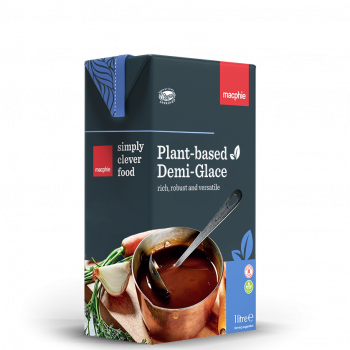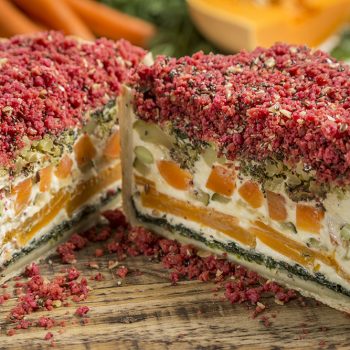
The mark of truly delicious food is an empty plate and we know that behind the scenes, you don’t want to be weighed down with waste either.
In spite of a huge rise in awareness of the impact of food production and waste on the ever-growing threat of climate change, the UK is still falling behind in sustainability responsibilities. A study by WRAP notes that 75% of waste is avoidable and it’s costing our industry £3.2billion.
We’re seeing big brands across the food industry making big commitments to tackle the issue of food waste. Greggs launched its first sustainability plan in March 2021, committing to cut food waste and source more sustainably by 2025 while Marks & Spencer has announced the rollout of its refillable programme – Fill Your Own – to a total of 11 stores, encouraging people to take only what they need and reduce the need for single-use plastic packaging.
However, the pandemic and changing restrictions and guidance within hospitality have made it particularly difficult to avoid waste within this setting. The hospitality sector loses £17.6bm a year due to no-shows according to new research, with over a quarter of 18 to 34-year-olds, failing to show for reservations. Since the sector reopened in 2021, 14% of people have not turned up to their reservation, with 12% saying they are more likely to no-show than they were before the pandemic (H2O Publishing, 2021).
Sustainability is no longer a nice to have but as businesses recover from the affects of the pandemic, is it top priority? Here’s some top tips to drive sustainable changes in your bakery or kitchen.
Choose clever products
Menus are still on average 18% smaller than pre-pandemic levels (Lumina Intelligence, 2022) therefore choose products that will work hard for you.
Versatile products can allow you to create a portfolio of dishes, without needing a store cupboard of ingredients. Not only could this save you money but ordering in fewer SKUs could reduce your carbon footprint. Across the industry customisation increases to boost menu efficiency and increase spend per head – 28% of all dishes on menus are now customisable, up 38% year on year (Lumina Intelligence, 2022).
Getting your foundations right is key – particularly as the eating out industry settles post pandemic. Look for products which work well across a variety of day parts or dishes and that don’t rely on you to add seasoning or spice to create flavour, yet still provide room for customisation and creative flair when the time is right.
Think about storage too. Opting for ambient or frozen products could offer you longer shelf-life on ingredients which is handy during quieter periods.
Ponder over packaging
Don’t just think about the products you’re ordering; consider how they’re packaged. Can your packaging be recycled or reused? A responsible supplier should provide clear direction on how to dispose of their packaging properly.
And consider how you’re serving your own products. More and more consumers are trying to avoid plastic so think about switching from plastic spoons to wooden, or choose biodegradable cups instead of plastic takeaway cups if you’re offering food to go. Suppliers like Vegware offer a variety of plant-based, compostable foodservice packaging.
At Macphie, we have moved all of our sweet & savoury sauces, glazes, desserts and dairy cream alternatives into cartons made up of 87% renewable material and signed up to become a member of On-Pack Recycling Label Ltd (OPRL) so that we can display clear recycling advice on every product in these ranges.

Think vegan
According to Veganuary, 21% of its participants sign up to go meat-free for a month do so over environmental concerns. Tap into this growing market by making sure you’re offering vegan options. There are a range of vegan ingredients now available, making it even easier for you to grow your menu. And to keep your SKU count low, look for vegan or plant-based options that could replace your meat alternative. For example, our Plant-based Demi Glace can be used in both meat, and meat-free dishes, providing full-bodied flavour for all diets, often without anyone noticing the difference.

For peace of mind, we recommend looking for vegan-certified products that have the mark of approval from The Vegetarian Society. Like other free-from diets, it’s important you can offer reassurance to your customers that they are completely free of animal derivatives.
Divert, don’t dispose
Despite best efforts, achieving zero waste is hard. And it’s inevitable that at times there will leftover food. Initiatives and charities like Too Good to Go and FareShare are available to divert surplus food to those who need or want it. This is a great way of redistributing your waste food while supporting your local community. Perhaps there’s a food bank near you who could use a donation now and then?
Get creative with leftovers
Getting creative with leftovers is a great way to reduce waste and to add some variety to your menu. Instead of disposing of day-old baguettes, chop them in half, add Macphie Pizza Topping, some tomato and mozzarella and pop them under the grill. Just like that you have a one-off lunch-time special.
Or use up leftover vegetables to create an “allotment pie” or turn cake off-cuts into cake pops by coating them in icing.

Make more with Macphie
Considering food waste and getting clever about product rationalisation for businesses is more important than ever and Macphie is here to help with versatile ranges that can be used across a number of applications, day parts and industry sectors.
These menu multi-taskers can be found here, with inspiration on how you can use them in a variety of different ways.
The current range includes 36 vegan-certified products such as vegan cake mixes and a plant-based cream alternative, cheese sauce, demi-glace and white sauce.
While we might sound like your granny, we believe in “waste not, want not”. If you do too, get in touch today.